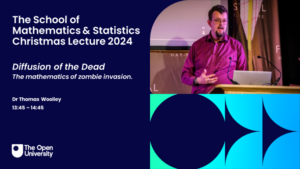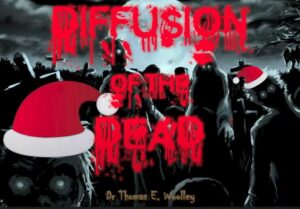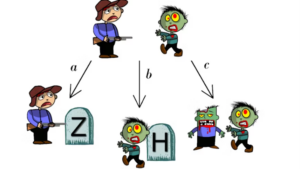Have you ever wondered just how long it is before a zombie shuffles into view? It might sound like something direct from a horror film, but knowing how soon you’ll need to dodge or outrun the undead could mean the difference between life, death, and – even worse – zombification!
Each year, on the first Tuesday in December, we hold our Christmas lecture for schools. This is an online event in which we invite a mathematician to talk about a current area of interest in mathematics in a fun and engaging manner to an audience of school students aged 16-18 from across the UK who are studying mathematics.

This year, we were thrilled to welcome Dr Thomas Woolley from Cardiff University, whose work in mathematical biology explores topics such as pattern formation and diffusion. In his spirited presentation on the mathematics of surviving a zombie apocalypse, Thomas expertly balances storytelling with serious mathematics, using secondary school calculus and horror-movie references to reveal what happens in the event of a zombie apocalypse.
If you’re eager to dissect the gruesome details – and pick up a few tricks for outsmarting zombies – be sure to check out the mathematics of surviving zombies with Thomas here where he explains things far better than I can!
Mathematics Enrichment
The OU Christmas lecture is an example of a mathematics enrichment event, in which our aim is to motivate students to study mathematics at university. By introducing new and exciting aspects of the subject not included in the school syllabus, we help students discover that mathematics is a dynamic and creative subject, replete with novel ideas and practical applications.
Creating an Enriching Event
One approach to planning and evaluating mathematics enrichment is to consider such events as opportunities outside the classroom to bring about “engagement” with mathematics (Santos & Barmby, 2010). In education it is common to think about “engagement” as having three aspects:
1. Behavioural Engagement
- Are learners paying attention?
- Are they actively participating?
2. Emotional Engagement
- How are learners feeling about the activity?
- Is it creating positive reactions and curiosity?
3. Cognitive Engagement
- Are learners exerting effort towards understanding the content?
- Are they understanding the advanced concepts?
Ideally, any enrichment event satisfies all three aspects.
Choosing the Right Topic
Selecting a topic that’s new and intriguing but still within reach of school-level mathematics is crucial. Too advanced or abstract, and students may feel overwhelmed or lose interest. Too simplistic, they might become bored. The ideal event blends familiar ideas (like basic calculus) with novel or popular contexts (like zombies), making it both accessible and relevant.

That’s exactly what Dr Thomas Woolley achieved:
- Thomas introduced real-world applications of mathematics to biology, such as animal patterns and swarming animals
- Thomas incorporated pop-culture references (zombies, horror-movie monsters)
- Thomas kept it interactive and playful, allowing students to contribute their own ideas about the philosophy of gothic horror
Modelling a Zombie Apocalypse
In his talk, Thomas initially took us on a quick tour of some applications of mathematics to biology, and biology to mathematics. He discussed how mathematics can be used to model swarming animals, and how it can be used to explain how stripes or spots form on some animals, showing everyone new and intriguing applications of mathematical ideas.
The inclusion of zombies wasn’t just an entertaining gimmick – there was serious maths involved. Using school-level calculus, Thomas explored diffusion processes, illustrated by simulations and videos of real experiments. The lecture provided a compelling example of how mathematical models can predict the movement of large groups, whether they’re flocks of animals or lumbering hordes of the undead.

Regarding survival tactics, Thomas demonstrated how a few strategic choices—like placing obstacles or, even better, simply running—could mean the difference between escape and joining the ranks of the zombies. Who knew calculus could save your brains?
Zombies might be fictional, but the underlying mathematics is very real—so keep your wits (and your brain) about you, and who knows what you’ll discover about the living world and beyond!
We hope this lecture inspired you to explore the applications of maths to real and fictitious scenarios. Have questions, comments or ideas? Share them below or connect with us on X and BlueSky @OUMathsStats.
Eager to get your school involved? Don’t hesitate to reach out to us at [email protected]. We’d love to hear from you!
Dr Andrew Neate, External Engagement Co-Lead, School of Mathematics and Statistics
Key Takeaways
- The OU Christmas Lecture 2024 featured Dr Thomas Woolley, who explored the mathematics of a zombie apocalypse using calculus and mathematical modelling.
- This event exemplified a successful mathematics enrichment activity, achieving behavioural, emotional, and cognitive engagement among students.
- Through the creative use of a pop-culture topic (zombies), familiar mathematical concepts (calculus) and engaging storytelling, Thomas delivered an inspiring and effective learning experience.
Santos, S. & Barmby, P., 2010, Enrichment and engagement in mathematics. In Proceedings of the British Congress for Mathematics Education April 2010. (https://bsrlm.org.uk/wp-content/uploads/2016/02/BSRLM-IP-30-1-26.pdf )
